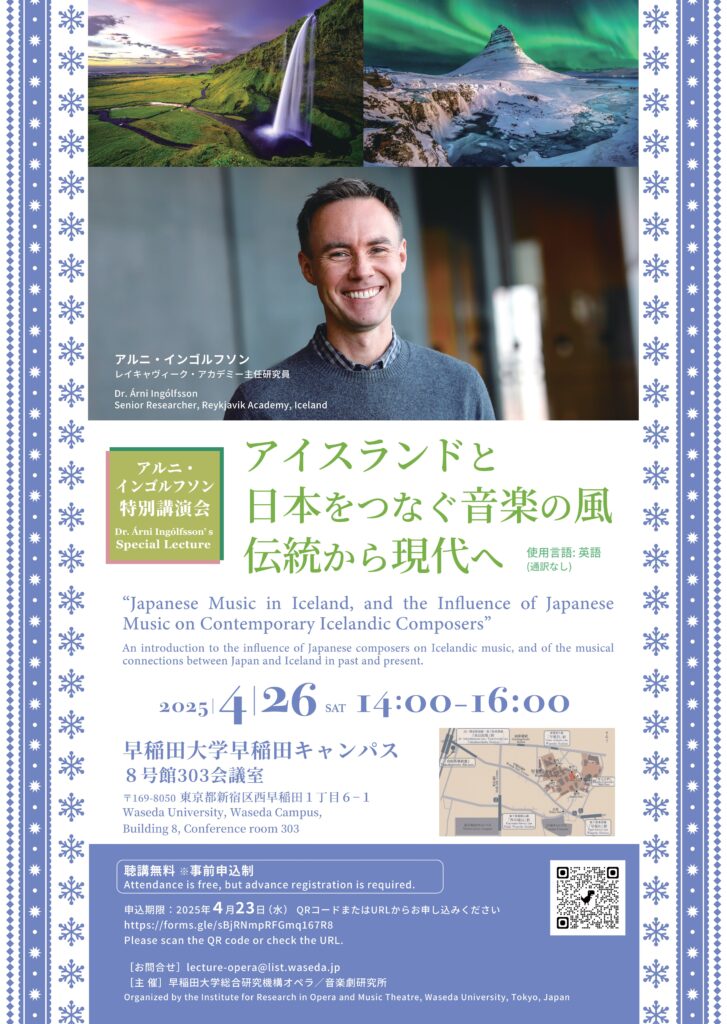English follows Japanese
オペラ/音楽劇研究所:アルニ・インゴルフソン特別講演会
「アイスランドにおける日本音楽:現代アイスランドの作曲家に対する日本音楽の影響」:アルニ・インゴルフソン
Dr. Árni Ingólfsson’s Special Lecture
“Japanese Music in Iceland, and the Influence of Japanese Music on Contemporary Icelandic Composers”
現代アイスランド音楽に対する日本音楽の影響の実態について、アイスランドの音楽学者アルニ・インゴルフソン氏が講演を行う。具体的には、①1960年代にアイスランドのラジオで團伊玖磨や武満徹の作品、横山克也の演奏が放送され、アイスランド市民が日本の伝統音楽に関心を抱いたこと、②1970年代からアトリ・スヴェインソン(1938-2019)やトルケル・シグルビョルンソン(1938-2013)などアイスランドを代表する現代音楽作曲家の作品において日本音楽の影響が明確に表れ始めたことに関する内容である。講演の際にはスヴェインソンの《フルート協奏曲》やオペラ《The Silk Drum》(1980年)など具体的な作品を取り上げ、実際に映像や音源を再生しながらアイスランド音楽と日本音楽(特に日本の能《綾の鼓》)の比較分析を行う。そのうえで、このような影響関係が日本人作曲家とアイスランドの演奏家たちとの緊密な交流のもとで発展していったこと(細川俊夫とニューミュージック・アンサンブル「カプト」)、映画業界などにおいても反映されていること(坂本龍一の音楽にインスパイアされた『ジョーカー』、『タール』の作曲家、及び2020年アカデミー賞最優秀映画音楽賞受賞のヒルドゥル・グィズナドッティル)について注目する。
開催概要
- 期 間:2025 年 4 月 26 日(土)14:00~16:00
- 会 場:早稲田キャンパス8号館303会議室
- 対 象:一般公開
- 言 語:英語(通訳なし)
- 主 催:早稲田大学総合研究機構オペラ/音楽劇研究所
コメント:23名の参加があった。
プロフィール
アルニ・ヘイミル・インゴルフソン:アイスランドの音楽学者で、ハーバード大学で歴史音楽学の博士号を取得(2003年)。現在レイキャヴィーク・アカデミー主任研究員。主な関心領域は中世から現代までのアイスランド音楽史で、アイスランド音楽に関する複数の著書がある。特に“Jón Leifs and the Musical Invention of Iceland”(インディアナ大学出版、2019年)は、『ニューヨーカー』誌のアレックス・ロスによって、その年の音楽に関するベストブックの1冊に挙げられた。また近著に“Music at World’s End: Three Exiled Musicians from Nazi Germany and Austria and Their Contribution to Music in Iceland” (SUNY Press, 2025)がある。2025年1月にはBBC Radio3の“European Road Trip: Early Music in Iceland”で13世紀以降のエッダに基づくアイスランドの教会合唱音楽について語っている。ピアニスト、チェンバリスト、指揮者としても欧米を中心に活躍しており、2003年にはカルミナ室内合唱団を創設し、10年間指揮者と芸術監督を務めた。彼の指揮のもとで合唱団は17~18世紀のアイスランドの古写本から音楽を集めた2枚のCDを発表し、いずれもアイスランド音楽賞の最優秀CD賞を受賞している(2008年と2011年)。

ポスターPDFは こちら
Report of Institute for Research in Opera and Music Theatre:Dr. Árni Ingólfsson’s Special Lecture
Dr. Árni Ingólfsson’s Special Lecture
“Japanese Music in Iceland, and the Influence of Japanese Music on Contemporary Icelandic Composers”
Abstract
Iceland has a short history of “Classical” music, which was only introduced there in the second half of the 19th century. Musical links between Iceland and Japan have an even shorter history, beginning in the 1960s with performances on the Icelandic Radio of music by composers such as Ikuma Dan and Tōru Takemitsu. At the same time, performances by musicians such as Katsuya Yokoyama opened the ears of Icelandic radio listeners for the sound-world of Japanese traditional instruments such as the shakuhachi.
Beginning in the early 1970s, Japanese influence can be clearly heard in the music of Iceland’s key modernist composers. Atli Heimir Sveinsson (1938–2019) referenced a Japanese sound-world in his award-winning Flute Concerto (1973) and Xanties (1975) for flute and piano. In his brilliant solo flute piece, Kalais (1976), Thorkell Sigurbjörnsson (1938–2013) asks for the flautist to remove the mouthpiece and play the final section of the work “shakuhachi-style”.
The most extensive example of Japanese influence in Icelandic modernist music is Sveinsson’s opera The Silk Drum (1980), which is based on the Japanese Noh play “Aya no Tsuzumi”. Premiered at the Reykjavík Music Festival in 1980, this opera was a great success and was seen as a landmark event in the history of Icelandic opera. The main gist of the story is the same as in the Japanese original, but the action is transferred from medieval Japan to the world of fashion in the modern West. An old man falls in love with a young and beautiful model, and the work thus becomes a cautionary tale of the modern world’s focus on superficial appearances rather than true substance.
In my lecture, I will discuss these works and their reception in Iceland, as well as the continuation of Japanese influence in the 21st century. This has taken place both through cultural exchange with groups such as the new-music ensemble Caput, which has worked closely with the Japanese composer Toshio Hosokawa, as well as direct influence, for example of the works of Ryuichi Sakamoto on composer Hildur Guðnadóttir (composer, Joker and Tár, Academy Award winner for best film score, 2020).
Event Outline
- Date and Time: April 26th, 2025 14:00-16:00
- Venue: Waseda University, Waseda Campus, Building 8, Conference room 303.
- Target: Open to the public
- Language: English (without translation)
- Organized by: Organized by the Institute for Research in Opera and Music Theatre, Waseda University, Tokyo, Japan
Comments: There were 23 participants.
Profile of Presenter
Árni Heimir Ingólfsson is an Icelandic musicologist and holds a PhD in historical musicology from Harvard University (2003). He is currently a senior researcher, Reykjavik Academy, Iceland. His primary area of interest is the history of Icelandic music from the Middle Ages to the present, and he is the author of several books on Icelandic music, including “Jón Leifs and the Musical Invention of Iceland” (Indiana University Press, 2019), which was listed as one of that year’s best books on music by Alex Ross of The New Yorker magazine. His most recent book is “Music at World’s End: Three Exiled Musicians from Nazi Germany and Austria and Their Contribution to Music in Iceland” (SUNY Press, 2025). As a pianist and harpsichordist, he has recorded several CDs and appeared in concert in Iceland, England, Germany, Italy, Canada, and the United States. Ingólfsson has twice been nominated for the Icelandic Book Award (academic/non-fiction) and is a two-time winner of the Icelandic Music Award (2008, 2011), for his CD recordings (with the Carmina Chamber Choir, which he founded in 2003) of music from Icelandic manuscripts from the seventeenth and eighteenth centuries.